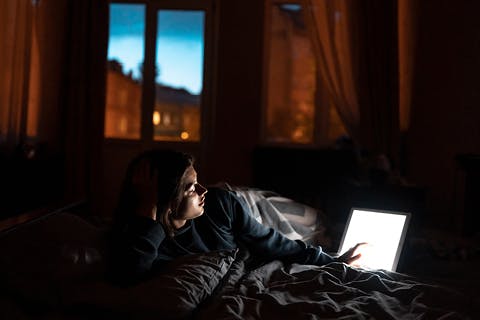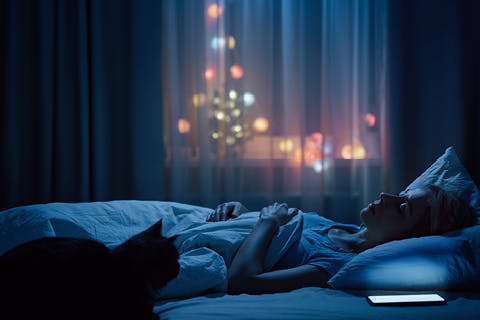Exploring Bedtime Procrastination

You’ve had a long day, and snuggling up in bed to soak in a good sound snooze is just what you’ve been waiting for since you clocked off… until you start scrolling, reading or doing nothing at all. You tell yourself you’ll stop soon, battling your eyelids to stave off sleep as long as possible, no matter how comfortable the mattress, plump the pillow, or sleek the sheets. But you’re still awake and you’re not sure why. Staying up late is just something you do now, even if you don’t necessarily want to.

What is bedtime procrastination?
Bedtime procrastination is a fairly new phenomenon, describing the conscious decision to stay awake longer in order to enjoy more leisure time in the evening. Often, those who take part in this type of sleep rebellion have a packed schedule, family commitments and a lack of free time during sleep-friendly hours.

What causes bedtime procrastination?
The temptation to stay up at night can vary depending on your circumstances. Perhaps you have a full daytime schedule, or are too busy during the day to relax, resulting in little free time to do things you enjoy. This can lead to indulging in more leisure time, even if it means sacrificing sleep. Of course, this doesn’t take into account biological and medical reasons, such as a misaligned body clock or higher loads of stress or anxiety, which can also cause us to stay up later than usual.

What are symptoms of sleep procrastination?
How can you tell you are procrastinating at bedtime, and not just having a few late nights? Some of the most common symptoms of sleep procrastination include:
- Consistently procrastinating sleep to the point you’re not getting enough
- Staying up longer than intended, despite having no real reason for doing so
- Putting off sleep knowing there could be negative consequences the following day (such as excessive tiredness and loss of concentration)
If only one or two of these sounds like you, it could just be a few late nights. If all of these hit a little too close to home, it may be bedtime procrastination.

So why do I stay up so late?
Not every decision you make will indicate you’re indulging in bedtime procrastination. You may stay up late because you want to, whether that’s finishing that last chapter of a new book or perhaps you need to get something urgent done (like that last-minute assignment, or a phone call with a friend). The main difference being, a continued conscious decision to stay up late, versus just a few late nights every now and then.
Staying up late to regain control
One reason why you might choose to stay up too late is to take back time you may have lost during normal waking hours. While no one can ever regain time they’ve lost to other activities - no matter how hard we try - this behaviour can lead to a long-term cycle if we’re not careful to address what brought us here in the first place.
Staying up late as sleep avoidance
Some people find themselves avoiding sleep due to stress, anxiety, sleep disorders or the common occurrence of nightmares. This can create a fear of going to sleep, which makes it difficult to relax, unwind and switch off, ready for sleep. All of these factors can all lead to continued bedtime procrastination in order to avoid sleep (rather than to enjoy more leisure time).

How do I stop bedtime procrastination?
Where bedtime procrastination tempts all of us at one time or another, there are a few things you can do to try and get to sleep earlier. Some ways to help limit bedtime procrastination and make your bed a place for rest (and hopefully reduce that extra time awake) can include:
Using soft, plush bedding to create a comfortable sleeping environment
Cutting down on using your bed for anything other than sleep (this helps connect the bed with sleep time rather than leisure time)
Sticking to a consistent bedtime routine and schedule, even on weekends (or non-work days), such as enjoying a relaxing herbal tea before bedtime
Putting down electronic devices such as phones and tablets half an hour before bedtime
Removing distractions or temptations from the bedroom, for instance leaving your phone to charge across the room, rather than your bedside table
The first step to a good nights’ sleep is ensuring your bed is a place you find comfortable, soothing and associate with rest. Whether that means maximising comfort with a mattress topper, finding the right pillow for your sleep profile, or creating a beautiful space for yourself, you’ll find bedding solutions here at Snooze.
References:
https://www.sleepfoundation.org/sleep-hygiene/revenge-bedtime-procrastination
https://www.healthline.com/health/sleep/how-can-i-stop-staying-up-late